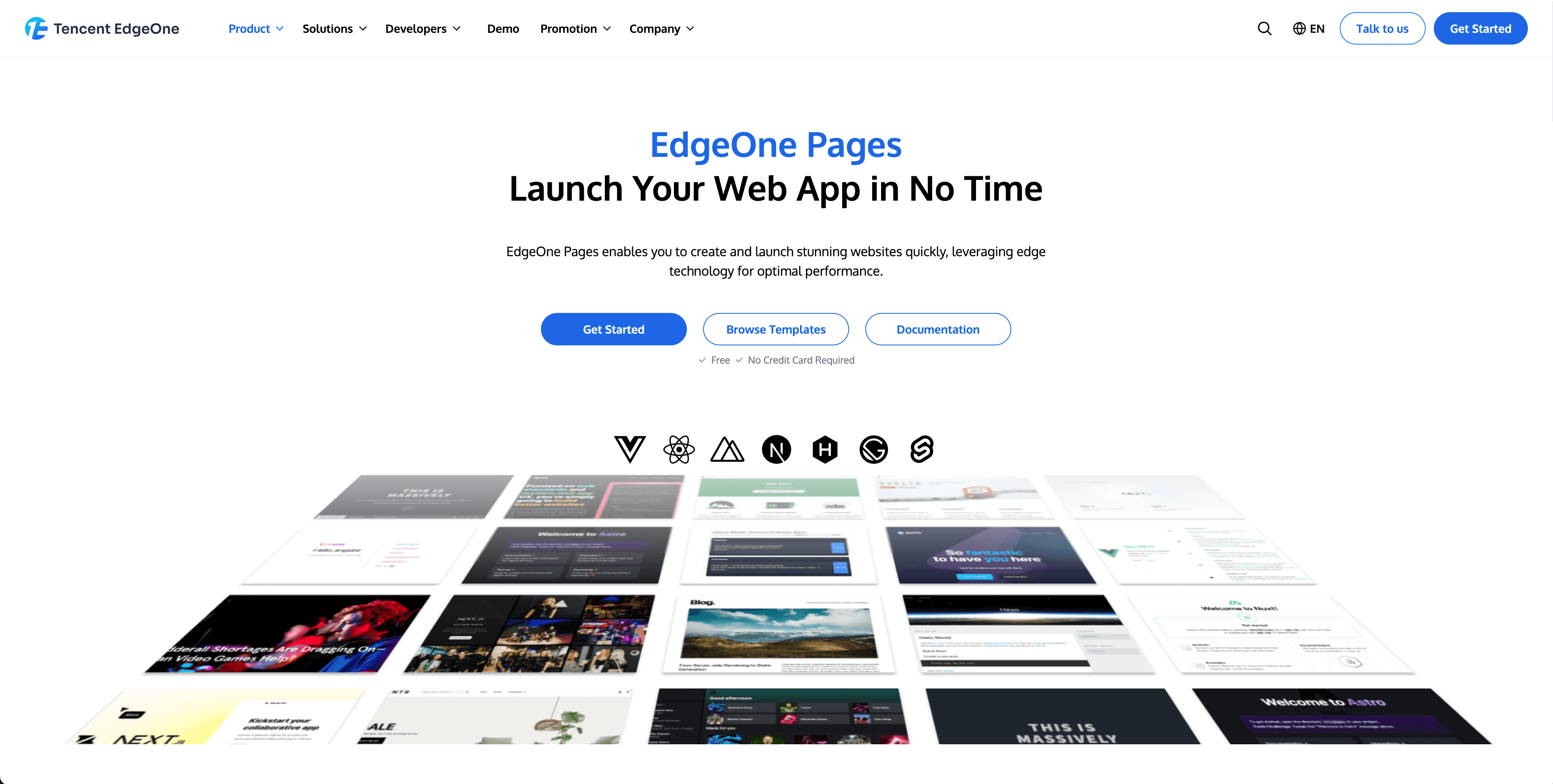10 Best HTML Hosting Websites for Your Web Projects in 2025

In today's digital age, having a well-hosted website is crucial for both businesses and individuals. Whether you're a web developer looking to deploy your latest project or a small business owner aiming to establish an online presence, choosing the right HTML hosting website can make all the difference. This article aims to provide a comprehensive list of the 10 best HTML hosting websites, taking into account various factors such as pricing, ease of use, performance, security, and customer support.
What is HTML Hosting?
HTML hosting is a type of web hosting specifically designed to support websites built primarily with HTML (Hypertext Markup Language). HTML is the standard markup language used to create and structure content on the web, including text, images, links, and other elements. HTML hosting ensures that your HTML-based website is accessible to users via the internet.
Key Features of HTML Hosting
1. File Storage
- HTML hosting provides server space where you can upload your HTML files, along with any associated files such as CSS (Cascading Style Sheets), JavaScript, images, and other multimedia content.
- These files are stored on the hosting provider's servers and are accessible via a domain name.
2. Server Environment
- The hosting environment is optimized to serve static HTML files. Unlike dynamic websites that require server-side scripting languages (like PHP, Python, or Ruby), HTML websites are typically static and do not require complex server-side processing.
- This makes HTML hosting simpler and often more cost-effective compared to hosting for dynamic websites.
3. Bandwidth and Traffic Management
- HTML hosting plans come with allocated bandwidth, which determines how much data can be transferred between your website and users' browsers.
- The amount of bandwidth you need depends on your website's traffic. More popular websites require higher bandwidth to handle increased traffic without performance issues.
4. Security
- Hosting providers offer various security features to protect your website from threats such as hacking, malware, and DDoS attacks.
- Common security measures include SSL certificates (for secure HTTPS connections), firewalls, and regular backups.
5. Customer Support
- Reliable customer support is crucial for troubleshooting issues and ensuring your website remains online.
- Look for hosting providers that offer 24/7 support through multiple channels, such as phone, email, and live chat.
6. Ease of Use
- Many HTML hosting providers offer user-friendly control panels (like cPanel) that make it easy to manage your website.
- Features may include file managers, database management tools, and one-click installers for popular web applications.
Types of HTML Hosting
1. Shared Hosting
- Shared hosting is the most common type of HTML hosting. Multiple websites share the same server resources, making it a cost-effective option.
- It is suitable for small to medium-sized websites with moderate traffic.
2. VPS (Virtual Private Server) Hosting
- VPS hosting provides a more dedicated environment, where your website shares a physical server but has its own allocated resources.
- This offers better performance and security compared to shared hosting and is suitable for websites with higher traffic.
3. Dedicated Hosting
- Dedicated hosting provides an entire server dedicated to your website, offering the highest level of performance and security.
- This is typically more expensive and is suitable for large, high-traffic websites that require maximum resources.
4. Cloud Hosting
- Cloud hosting uses a network of interconnected servers to host your website, providing scalability and reliability.
- It is a flexible option that can handle varying levels of traffic and is suitable for websites that need to scale quickly.
Why Choose HTML Hosting?
1. Simplicity
- HTML hosting is straightforward and easy to set up, making it ideal for beginners or those with basic web development skills.
- It is particularly suitable for static websites that do not require complex server-side processing.
2. Cost-Effectiveness
- Hosting for HTML websites is generally less expensive than hosting for dynamic websites, as it requires fewer resources.
- This makes it a budget-friendly option for small businesses, personal blogs, and portfolios.
3. Performance
- Static HTML websites typically load faster than dynamic websites because they do not require server-side processing.
- Faster loading times can improve user experience and search engine rankings.
4. Scalability
- While HTML hosting is designed for static websites, many providers offer scalable plans that can grow with your website's needs.
- This ensures that your website remains performant and reliable as your traffic increases.
Top 10 Best HTML Hosting Websites
1. EdgeOne Pages

EdgeOne Pages is a modern web development and deployment platform built on the Tencent EdgeOne infrastructure. It is designed to help developers quickly build and deploy static sites and serverless applications. By integrating edge computing capabilities, it ensures efficient content delivery and dynamic feature expansion, supporting fast access for global users.
Key Features
- Global Acceleration: Leverage Tencent Cloud's global distribution network to cache static resources at edge nodes closest to users, ensuring smooth experiences and enhanced website performance.
- Edge Serverless: Write ultra-low latency server-side logic in JavaScript at edge nodes without configuring or managing servers.
- Automated Deployment: Integrate with Git repositories (e.g., GitHub, GitLab) to automatically build and deploy your site with every code commit.
- Full-Stack Development: Support for dynamic applications using edge functions (Pages Functions) and KV storage, enabling lightweight dynamic services without traditional servers.
- Free and Stable Service: During the public beta, all features are fully available with no restrictions, providing a free and stable service.
Cons
- Performance: Fast loading times due to global CDN.
- Reliability: High uptime and consistent performance.
- Ease of Use: Simple setup process for static sites.
Price
Currently in public beta with a free tier offering unlimited access to all features.
Deploy for Free: 🔥 Pages Drop
2. Vercel
Vercel is a developer-focused platform that simplifies the deployment and management of static websites and serverless functions.
Features
- Deployment: One-click deployment from GitHub, GitLab, or Bitbucket.
- Performance: Fast global delivery with automatic CDN.
- Scalability: Scales automatically to handle traffic spikes.
Pros
- Developer-Friendly: Seamless integration with development workflows.
- Performance: Fast and reliable content delivery.
- Scalability: Automatically scales to handle traffic.
Cons
- Learning Curve: Requires some technical knowledge to fully utilize.
- Cost: Advanced features can be expensive.
Price
Free tier available; paid plans start at $20/month.
3. Netlify
Netlify is a popular hosting platform for static websites, offering easy deployment and powerful features for developers.
Features
- Deployment: Continuous deployment from Git repositories.
- Performance: Global CDN for fast content delivery.
- Security: Built-in security features, including SSL certificates.
Pros
- Ease of Use: Simple setup and deployment process.
- Performance: Fast and reliable content delivery.
- Security: Robust security features.
Cons
- Limited Free Tier: Some features are restricted on the free plan.
- Cost: Paid plans can be expensive for advanced features.
Price
Free tier available; paid plans start at $19/month.
4. GitHub Pages
GitHub Pages is a free hosting service for static websites directly from a GitHub repository.
Features
- Free Hosting: Host your static site for free.
- Integration: Seamless integration with GitHub repositories.
- Customization: Supports custom domains and SSL.
Pros
- Cost: Free to use for static sites.
- Integration: Easy to set up with existing GitHub projects.
- Customization: Supports custom domains and SSL.
Cons
- Limited Features: No server-side processing.
- Performance: Limited to GitHub's infrastructure.
Price
Free to use.
5. Hostinger
Hostinger is an affordable and user-friendly hosting provider that offers a range of plans for static websites.
Features
- Ease of Use: User-friendly control panel and website builder.
- Performance: Fast and reliable hosting with good uptime.
- Support: 24/7 customer support.
Pros
- Affordability: Cost-effective plans.
- Ease of Use: Simple setup and management.
- Support: Responsive customer support.
Cons
- Renewal Rates: Higher renewal rates compared to initial offers.
- Features: Limited features on lower-tier plans.
Price
Starts at $2.99/month.
6. Bluehost
Bluehost is a well-known hosting provider that offers reliable and feature-rich plans for static websites.
Features
- Performance: Fast and reliable hosting with good uptime.
- Support: 24/7 customer support.
- Ease of Use: User-friendly control panel and website builder.
Pros
- Performance: Fast and reliable hosting.
- Support: Excellent customer support.
- Ease of Use: Simple setup and management.
Cons
- Renewal Rates: Higher renewal rates compared to initial offers.
- Cost: More expensive than some competitors.
Price
Starts at $2.95/month.
7. GoDaddy
GoDaddy is a comprehensive hosting provider that offers a range of plans and features for static websites.
Features
- Ease of Use: User-friendly control panel and website builder.
- Performance: Fast and reliable hosting with good uptime.
- Support: 24/7 customer support.
Pros
- Ease of Use: Simple setup and management.
- Performance: Fast and reliable hosting.
- Support: Excellent customer support.
Cons
- Renewal Rates: Higher renewal rates compared to initial offers.
- Cost: More expensive than some competitors.
Price
Starts at $5.99/month.
8. Render
Render is a modern hosting platform that supports static websites and serverless functions, offering a developer-friendly environment.
Features
- Deployment: Continuous deployment from Git repositories.
- Performance: Fast and reliable content delivery.
- Scalability: Automatically scales to handle traffic spikes.
Pros
- Developer-Friendly: Seamless integration with development workflows.
- Performance: Fast and reliable content delivery.
- Scalability: Automatically scales to handle traffic.
Cons
- Cost: Paid plans can be expensive for advanced features.
- Complexity: Requires some technical knowledge to fully utilize.
Price
Free tier available; paid plans start at $25/month.
9. Kinsta
Kinsta is a high-performance hosting provider that offers reliable and scalable solutions for static websites.
Features
- Performance: Fast and reliable hosting with good uptime.
- Scalability: Easily scales to handle high traffic volumes.
- Support: 24/7 customer support.
Pros
- Performance: Fast and reliable hosting.
- Scalability: Easily scales to handle traffic.
- Support: Excellent customer support.
Cons
- Cost: More expensive than some competitors.
- Complexity: Requires some technical knowledge to fully utilize.
Price
Starts at $30/month.
10. Tiiny.host
Tiiny.host is a simple and affordable hosting solution for static websites, offering easy setup and management.
Features
- Ease of Use: Simple setup and management.
- Performance: Fast and reliable hosting.
- Support: Responsive customer support.
Pros
- Ease of Use: Simple setup and management.
- Performance: Fast and reliable hosting.
- Cost: Affordable plans.
Cons
- Limited Features: Basic features compared to some competitors.
- Support: Limited support options.
Price
Free tier available; Starts at $5/month.
How to Choose the Right HTML Hosting for Your Needs
Assessment Criteria Based on Project Size
1. Small Personal Projects:
- Consider free options like GitHub Pages or Netlify
- Budget shared hosting from Hostinger or HostGator
- Focus on ease of use rather than advanced features
2. Medium Business Websites:
- Look for reliable shared or VPS hosting
- Consider SiteGround, Bluehost, or A2 Hosting
- Prioritize uptime guarantees and support quality
3. Large, High-Traffic Websites:
- VPS or dedicated hosting recommended
- Consider performance-focused providers like A2 or SiteGround
- Look for scalable solutions with CDN integration
Budget Considerations
- Calculate the total cost including renewal rates
- Consider the length of commitment required for promotional pricing
- Factor in additional costs for essentials like SSL, backups, and email
- Weigh free options against their limitations for your project
Technical Requirements Evaluation
- Static HTML only, or need for server-side processing?
- Required development tools and environments
- Database requirements
- Need for specific technologies (Node.js, PHP version, etc.)
- Deployment workflow preferences
Scalability Factors
- Traffic growth projections
- Resource upgrade options
- Ease of migration to higher plans
- Auto-scaling capabilities
- Cost implications of scaling
Setting Up Your First HTML Website
Domain Registration Tips
- Choose a domain name relevant to your content or brand
- Consider SEO implications of your domain choice
- Register through your hosting provider for simplicity or separately for flexibility
- Set up auto-renewal to avoid accidentally losing your domain
File Uploading Best Practices
- Use secure FTP (SFTP) for transferring files
- Organize files in logical folders
- Optimize images before uploading
- Follow proper file naming conventions (lowercase, no spaces)
- Set correct file permissions for security
Basic Configuration Steps
- Set up your hosting account and access credentials
- Configure your domain and DNS settings
- Enable HTTPS with an SSL certificate
- Set up email accounts if needed
- Install any required applications
- Upload your HTML, CSS, and other web files
- Configure custom error pages
Testing Your Website
- Check your website across multiple browsers
- Test on mobile devices
- Verify all links are working
- Check loading speed using tools like Google PageSpeed Insights
- Test contact forms and other interactive elements
Conclusion
Choosing the right HTML hosting website is essential for ensuring your website's success. The options listed above are among the best in the industry, each offering unique features and benefits. Whether you prioritize speed, affordability, or eco-friendliness, there is a hosting provider that meets your needs. We encourage you to explore these options and select the best HTML hosting website for your specific requirements.
FAQs about HTML Hosting
1. What is HTML hosting?
Answer: HTML hosting is a type of web hosting specifically designed to support websites built primarily with HTML (Hypertext Markup Language). It provides server space to store your HTML files and associated assets (like CSS, JavaScript, and images) and ensures that your website is accessible via the internet.
2. Why do I need HTML hosting?
Answer: HTML hosting is necessary to make your website available to users worldwide. Without hosting, your website files would only be accessible on your local machine. Hosting providers offer the infrastructure and services needed to serve your website content to visitors.
3. What are the main types of HTML hosting?
Answer: The main types of HTML hosting include:
- Shared Hosting: Multiple websites share the same server resources. It is cost-effective and suitable for small to medium-sized websites.
- VPS (Virtual Private Server) Hosting: Your website shares a physical server but has its own allocated resources. It offers better performance and security compared to shared hosting.
- Dedicated Hosting: An entire server is dedicated to your website, providing maximum performance and security. It is suitable for large, high-traffic websites.
- Cloud Hosting: Uses a network of interconnected servers to host your website, offering scalability and reliability.
4. What are the key features to look for in an HTML hosting provider?
Answer: Key features to consider include:
- Performance: Fast loading times and reliable uptime.
- Ease of Use: User-friendly control panels and easy setup processes.
- Security: SSL certificates, firewalls, and regular backups.
- Support: 24/7 customer support through multiple channels.
- Pricing: Cost-effective plans that offer good value for money.
5. What is the difference between HTML hosting and WordPress hosting?
Answer: HTML hosting is designed for static websites built with HTML, CSS, and JavaScript. It is simpler and often more cost-effective. WordPress hosting, on the other hand, is optimized for WordPress websites, which are dynamic and require server-side processing. WordPress hosting often includes additional features like one-click WordPress installation, automatic updates, and enhanced security measures.
6. Can I use HTML hosting for a dynamic website?
Answer: While HTML hosting can technically serve static content from a dynamic website, it is not designed for server-side processing. For dynamic websites that require languages like PHP, Python, or Ruby, you should choose a hosting plan that supports these technologies.
7. What is a CDN, and why is it important for HTML hosting?
Answer: A CDN (Content Delivery Network) is a network of servers distributed globally that deliver content to users based on their geographic location. Using a CDN can significantly improve the loading times of your website by serving content from the nearest server. This is particularly important for HTML hosting to ensure fast and reliable content delivery to users worldwide.
8. How do I migrate my website to a new HTML hosting provider?
Answer: Migrating your website involves transferring your website files and databases to the new hosting provider. Most hosting providers offer tools to help with this process, such as file managers and database import/export options. Some providers also offer free site migration services as part of their plans. It's important to back up your website before starting the migration process.
9. Can I use my own domain name with HTML hosting?
Answer: Yes, most HTML hosting providers allow you to use your own domain name. You can purchase a domain name from a domain registrar and then point it to your hosting provider's servers. This process typically involves updating the DNS (Domain Name System) settings to direct traffic to your hosted website.
10. How do I choose the right HTML hosting provider?
Answer: To choose the right HTML hosting provider, consider the following:
- Needs: Assess your website's requirements in terms of traffic, performance, and scalability.
- Budget: Determine your budget and look for plans that offer good value for money.
- Features: Ensure the hosting provider offers the features you need, such as performance, security, and support.
- Reviews: Read reviews and compare providers to make an informed decision.

